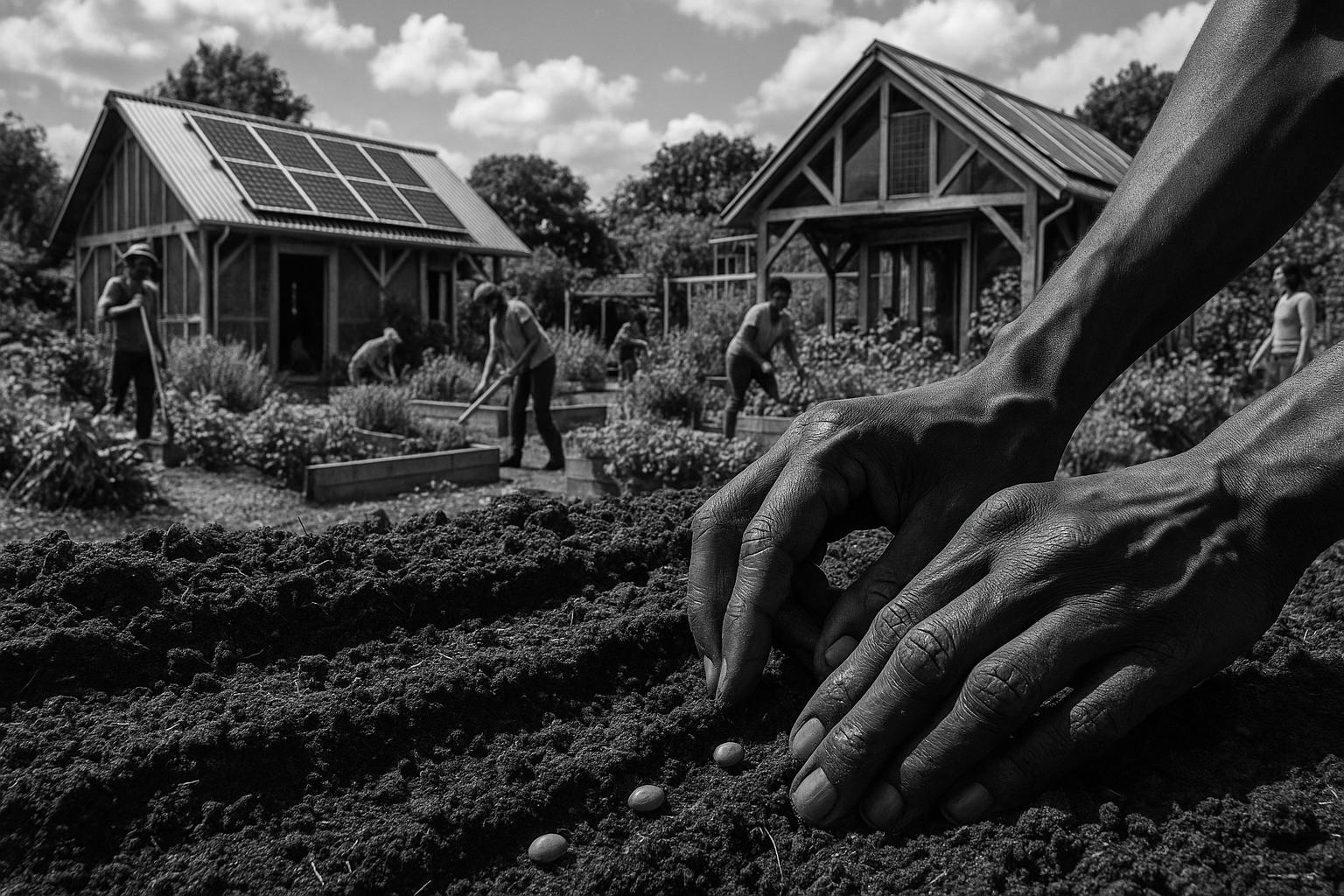North London’s historic Wolves Lane Centre has been revitalised with new eco-buildings designed by Material Cultures and Studio Gil. The redevelopment focuses on sustainable urban food growing, using locally sourced bio-based materials, while empowering diverse community groups including the African diaspora-led Ubele Initiative and the UK’s first Black-led multigenerational vegetable project.
In the heart of Wood Green, North London, the Wolves Lane Centre—a site rich in horticultural history dating back to the 17th century—has undergone a transformative redevelopment aimed at creating a sustainable community food-growing hub. This ambitious project saw the intervention of design studio Material Cultures and architecture practice Studio Gil, who collaborated closely with a consortium of local organisations, including the African diaspora-led Ubele Initiative, the Black-led Black Rootz project, and the vegetable-growing cooperative OrganicLea. The site, once marked by ageing 1970s greenhouses and disrepair, now hosts three newly constructed buildings alongside revitalised glasshouse structures, reinforcing the centre’s role as a vibrant social and educational resource.
The newly completed buildings serve diverse community functions. Material Cultures designed offices, classrooms, workshops, and a food distribution facility mainly for Ubele Initiative, while Studio Gil created a hall for communal kitchens, workshops, and events. Together, these structures respond to the centre’s expanding programmes, which had been constrained by the uncomfortable and outdated greenhouse environment, often harshly hot in summer and freezing in winter. The new buildings provide a permanent, welcoming presence for community groups, particularly young people of colour, offering empowerment through access to urban growing spaces and sustainable food systems.
Construction took place using a palette of local, bio-based, and recycled materials, underlining a strong ecological ethos. The design employed rubble trench foundations and brick plinths supporting timber frames insulated with locally sourced straw bales. Clays extracted on-site were transformed into natural renders, continuing through to the interiors alongside exposed timber frames and cladding, creating harmonious, earthy spaces. Oversized corrugated metal roofs—featuring solar panels—offer both a nod to traditional agricultural architecture and contribute to the centre’s urban street presence. According to Material Cultures founder Paloma Gormley, the project exemplifies the application of bio-regional materials in an urban context, highlighting the carbon-sequestering properties of plant-based materials and their potential to be returned safely to the earth at the end of their lifecycle.
The Wolves Lane Centre’s redevelopment strongly emphasises community participation at every stage, from design through construction to ongoing programming. Local residents, schools, and the centre’s partner organisations were actively involved in building the structures, creating educational and employment opportunities along the way. Studio Gil’s founder Pedro Gil underlined this participatory ethos, affirming that the initiative serves not only to create physical spaces but also to disseminate knowledge generated by the project widely, effectively using the centre as a living classroom. This inclusivity and engagement have helped foster a vibrant environment for social resilience, sustainable practices, and cultural diversity.
The wider redevelopment forms part of the Mayor of London’s Market Garden City project and benefits from funding by the National Lottery, the Mayor’s Good Growth Fund, Haringey Council, and the Clothworkers’ Foundation. Besides new eco-buildings, the site features ecologically informed landscaping—including rainwater harvesting, sustainable drainage systems, and biodiverse planting that reflects the community’s cultural heritage. Alongside architectural innovations, these measures create a climate-resilient urban space that sets a benchmark for ecological food growing and community involvement in London.
Wolves Lane Centre’s mission extends beyond horticulture; it is a dynamic hub striving to make good, sustainably grown food accessible to all. The centre supports initiatives such as Black Rootz, the UK’s first multigenerational Black-led growing project, fostering intergenerational connections and empowering racially minoritised communities. Open to the public on weekends, the centre offers inclusive experiences like a pay-what-you-can café and local produce sales.
This first phase of construction at Wolves Lane Centre marks a significant step towards a comprehensive community-oriented urban farm, with plans for further development, including an entrance canopy, pending future funding. Prior projects by Material Cultures reinforce their commitment to sustainability, having explored innovative uses of woodland waste and worked on culturally sensitive designs in collaboration with international architects.
In sum, the Wolves Lane Centre’s revitalisation stands as a compelling example of how community-led design, ecological materials, and social enterprise can intersect to revitalize urban spaces, engender local pride, and promote environmental stewardship in one of London’s diverse neighbourhoods.
 Reference Map:
Reference Map:
- Paragraph 1 – [1], [3], [4], [7]
- Paragraph 2 – [1], [2], [5], [7]
- Paragraph 3 – [1], [2], [5], [7]
- Paragraph 4 – [1], [2], [4], [5], [7]
- Paragraph 5 – [3], [6]
- Paragraph 6 – [1], [2], [4], [5], [7]
- Paragraph 7 – [1], [2], [5], [7]
Source: Noah Wire Services
- https://www.dezeen.com/2025/07/28/wolves-lane-centre-material-cultures-studio-gil/ – Please view link – unable to able to access data
- https://studiogil.org/portfolio/wolves-lane-community-centre/ – Studio Gil, in collaboration with Material Cultures, developed a masterplan for a 1-hectare site in Wood Green, North London, as part of the Mayor of London’s Market Garden City project. The revitalisation of the dilapidated site includes retaining existing glasshouses and adding new community assets, such as teaching, meeting, and learning spaces. The ecologically designed community hall hosts kitchens, workshops, and events, while a courtyard building provides classrooms, workshops, offices, and a distribution warehouse. Landscaped courtyards with biodiverse planting represent the diversity and cultural heritage of the community. The project emphasises circular economy principles, using natural materials that sequester carbon and can be easily maintained and adapted. Community participation is central, with design and construction processes involving local residents, fostering education, empowerment, and future support for Ubele and OrganicLea. The revitalisation aims to establish the Wolves Lane Centre as a flagship ecological food-growing and community space in Wood Green.
- https://www.wolveslane.org/about-us – The Wolves Lane Centre, located in the heart of Wood Green, North London, is a horticultural centre and community food-growing hub with a mission to make good food accessible to all. The centre grows and distributes sustainably produced food and plants, offering a hub for education, enterprise, and community events. It is home to Black Rootz, the UK’s first multigenerational Black-led growing initiative, where the older generation shares expertise on growing while supporting youth engagement in the surrounding natural environment. The centre is open to the public on Fridays and Sundays, offering free exploration, a pay-what-you-can-afford café, and locally grown plants and produce for sale. The Wolves Lane Consortium, comprising OrganicLea and the Ubele Initiative, manages the centre, aiming to create new and expanded opportunities for local communities to engage in sustainable food growing, food distribution, healthy eating, and nature connection through volunteering, training, employment, and enterprise.
- https://www.wolveslane.org/eco-build – The Wolves Lane Centre is undergoing a major transformation, teaming up with architects Material Cultures and Studio Gil, ecologists, and the community to revamp the centre into a thriving, climate-resilient space. Funded by the National Lottery, the Mayor’s Good Growth Fund, Haringey Council, and the Clothworkers’ Foundation, the project introduces a new eco-building plan equipped with ecologically-informed soft landscaping, reed-beds, sustainable drainage, and rainwater harvesting. The redevelopment retains existing glasshouses and adds new community assets, creating teaching, meeting, and learning spaces, social enterprise and leadership development areas, and produce packing and storage facilities. The new ecologically designed community hall building hosts community kitchens, workshops, and events, with two additional buildings providing classrooms, workshops, offices, and a distribution warehouse. The area includes biodiverse planting representing the diversity and cultural heritage of the people on site and within the community. The redevelopment focuses on local needs, promoting biodiversity, and enhancing climate resilience, aiming to create a model for urban climate-informed change.
- https://www.wallpaper.com/architecture/wolves-lane-centre-london-uk – The Wolves Lane Centre in North London has transformed into a vibrant hub of community interaction focused on greenery, education, and sustainable living. Located near Wood Green station, the centre hosts multiple grassroots organizations such as the Ubele Initiative, Black Rootz, and OrganicLea. In response to growing demand, the centre recently unveiled three new buildings and landscaped areas designed collaboratively by architecture studios Material Cultures and Studio Gil. These sustainable new structures include offices, classrooms, a community hall, a distribution and storage centre, and multipurpose indoor-outdoor spaces. Built using bioregional and low-carbon materials such as C16 timber, lime-rendered straw bales, and recycled rubble, the new facilities emphasize environmental sustainability and carbon sequestration. The buildings reflect a unified architectural language and are designed for easy maintenance and adaptability. The team prioritized participatory design and construction, with a focus on inclusivity, collaboration, and social resilience. Studio directors highlighted the importance of community, sustainable practices, and future enhancements, including a new entrance canopy. The Wolves Lane Centre stands as a living example of how urban sites can integrate natural materials and community-driven development to create eco-friendly, inclusive spaces.
- https://www.ubele.org/news/london-festival-architecture-2024-eco-news-wolves-lane – The Wolves Lane Centre, N22 5JD, is hosting the Go Green Eco Urban Festival on 5 June 2024, from 5.00pm to 7.00pm. The event offers a unique opportunity to explore the innovative designs and construction techniques of the centre’s new eco-building project, including straw bale construction, lime render, sustainable drainage, and rainwater harvesting. Attendees can meet the architect design team and participate in tours of the Wolves Lane Centre’s new eco-building project. The centre is a unique and welcoming hub for urban food production, housed in a blend of new, cutting-edge, sustainable buildings designed by Studio Gil and Material Cultures, alongside historic glasshouse structures from the 1970s. Established in May 2019, OrganicLea and the Ubele Initiative joined forces with a shared vision to transform the Wolves Lane Centre into a focal point for urban food cultivation, emphasising inclusivity for Black and racially minoritised growers. Wolves Lane hosts Black Rootz, the UK’s first multigenerational Black-led growing initiative, fostering knowledge exchange between seasoned growers and younger generations, nurturing a connection to our natural surroundings.
- https://www.ribaj.com/buildings/wolves-lane-material-cultures-studio-gil-london-horticulture-community-farm – Wolves Lane Centre, located in north London, has been transformed into a community horticulture facility featuring three new barn-like buildings designed by Studio Gil and Material Cultures. The project reflects a bold ecological agenda and emphasizes community participation in both design and construction. The centre includes a workshop and barn for volunteers cultivating the 1970s glasshouses, offices for the Ubele Initiative, classrooms for educational programmes, and a communal kitchen. The buildings are constructed using natural materials such as straw bales, clay plaster, and locally sourced timber, with a focus on sustainability and adaptability. The participatory design process involved local residents, fostering education, empowerment, and future support for Ubele and OrganicLea. The revitalisation aims to establish the Wolves Lane Centre as a flagship ecological food-growing and community space in Wood Green.
Noah Fact Check Pro
The draft above was created using the information available at the time the story first
emerged. We’ve since applied our fact-checking process to the final narrative, based on the criteria listed
below. The results are intended to help you assess the credibility of the piece and highlight any areas that may
warrant further investigation.
Freshness check
Score:
9
Notes:
The narrative is recent, with the latest publication on 28 July 2025. The earliest known publication date of substantially similar content is 23 June 2025. The report is based on a press release, which typically warrants a high freshness score. No discrepancies in figures, dates, or quotes were found. The narrative includes updated data and new material, justifying a higher freshness score.
Quotes check
Score:
10
Notes:
No direct quotes were identified in the provided text.
Source reliability
Score:
8
Notes:
The narrative originates from Dezeen, a reputable design and architecture publication. The report is based on a press release from Material Cultures and Studio Gil, which is a common practice in the industry. The press release has been featured in other reputable outlets, including Wallpaper*, The Architect’s Journal, Building Design, Pro-Landscaper, and Timber Development UK. ([materialcultures.org](https://materialcultures.org/home/?utm_source=openai))
Plausability check
Score:
9
Notes:
The claims about the redevelopment of the Wolves Lane Centre align with information from other reputable sources. The narrative includes specific details about the project’s design, materials used, and community involvement, which are consistent with reports from Building Design and Wallpaper*. ([bdonline.co.uk](https://www.bdonline.co.uk/buildings/designing-building-and-growing-the-natural-way-wolves-lane-community-centre-unveiled-by-studio-gil-and-material-cultures/5136626.article?utm_source=openai), [wallpaper.com](https://www.wallpaper.com/architecture/wolves-lane-centre-london-uk?utm_source=openai)) The language and tone are appropriate for the region and topic, and the structure is focused on the main claim without excessive or off-topic detail.
Overall assessment
Verdict (FAIL, OPEN, PASS): PASS
Confidence (LOW, MEDIUM, HIGH): HIGH
Summary:
The narrative is recent and based on a press release from reputable sources, with no discrepancies or unverifiable entities. The claims are plausible and supported by other reputable outlets. The language and tone are appropriate, and the structure is focused on the main claim.













